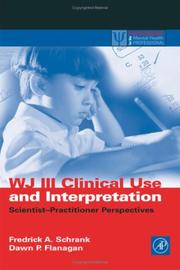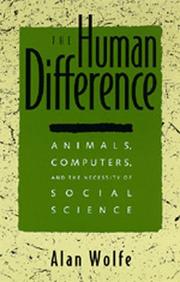| Listing 1 - 5 of 5 |
Sort by
|
Book
ISBN: 0128021101 0128020768 9780128021101 9780128020760 Year: 2016 Publisher: Amsterdam, [Netherlands] : Academic Press,
Abstract | Keywords | Export | Availability | Bookmark
 Loading...
Loading...Choose an application
- Reference Manager
- EndNote
- RefWorks (Direct export to RefWorks)
"WJ IV Clinical Use and Interpretation: Scientist-Practitioner Perspectives provides clinical use and interpretive information for clinical practitioners using the Woodcock-Johnson, Fourth Edition (WJ IV). The book discusses how the cognitive, achievement, and oral language batteries are organized, a description of their specific content, a brief review of their psychometric properties, and best practices in interpreting scores on the WJ IV. Coverage includes the predictive validity of its lower order factors and the clinical information that can be derived from its 60 individual subtests. Part II of this book describes the clinical and diagnostic utility of the WJ IV with young children for diagnosing learning disabilities in both school age and adult populations, and for identifying gifted and talented individuals. Additionally, the book discusses the use of the WJ IV with individuals whose culture and language backgrounds differ from those who are native English speakers and who were born and raised in mainstream US culture"--Provided by publisher.
Woodcock-Johnson Tests of Cognitive Ability. --- WJTCA (Psychology) --- Cognition --- Intelligence tests --- Testing --- Intelligence levels --- Intelligence testing --- IQ tests --- Mental tests --- Psychological tests

ISBN: 1280927097 9786610927098 1417556048 0080492452 0126289824 9780126289824 9781417556045 1592784747 9781592784745 Year: 2003 Publisher: San Diego, Calif. : Academic Press,
Abstract | Keywords | Export | Availability | Bookmark
 Loading...
Loading...Choose an application
- Reference Manager
- EndNote
- RefWorks (Direct export to RefWorks)
WJ III Clinical Use and Interpretation presents a wide variety of clinical applications of the WJ III from leading experts. Each chapter will provide the reader with insights into patterns of cluster and test scores from both the WJ III Tests of Cognitive Abilities and WJ III Tests of Achievement that can assist with interpretation and formulation of diagnostic hypotheses for clinical practice. WJ III Clinical Use and Interpretation provides expert guidance for using the WJ III with individuals with a broad array of learning and neuropsychological problems, includin
Woodcock-Johnson Tests of Cognitive Ability. --- Intelligence tests. --- Intelligence levels --- Intelligence testing --- IQ tests --- Mental tests --- WJTCA (Psychology) --- Testing --- Psychological tests --- Cognition --- Intelligence tests --- #KVHB:Psychodiagnostiek --- #KVHB:Woodcock-Johnson --- #KVHB:Test; cognitieve vaardigheden

ISBN: 0585274177 0520915615 0520080130 0520089413 9780520915619 9780585274171 9780520080133 Year: 1993 Publisher: Berkeley University of California Press
Abstract | Keywords | Export | Availability | Bookmark
 Loading...
Loading...Choose an application
- Reference Manager
- EndNote
- RefWorks (Direct export to RefWorks)
Are we losing touch with our humanity? Yes, contends Alan Wolfe in this provocative critique of modern American intellectual life. From ecology, sociobiology, and artificial intelligence to post-modernism and the social sciences, Wolfe examines the antihumanism underlying many contemporary academic trends. Animal rights theorists and "ecological extremists" too often downplay human capacities. Computers are smarter than we are and will soon replace us as the laws of evolution continue to unfold. Even the humanities, held in sway by imported theories that are explicitly antihumanistic in intention, have little place for human beings. Against this backdrop, Wolfe calls for a return to a moral and humanistic social science, one in which the qualities that distinguish us as a species are given full play. Tracing the development of modern social theory, Wolfe explores the human-centered critical thinking of eighteenth- and nineteenth-century scholars, now eclipsed by post-modern and scientistic theorizing. In the work of Durkheim, Marx, Weber, and Mead, human beings are placed on the center stage, shaping and interpreting the world around them. Sociology in particular emerged as a distinct science because the species it presumed to understand was distinct as well. Recent intellectual trends, in contrast, allow little room for the human difference. Sociobiology underlines the importance of genetics and mathematically governed evolutionary rules while downplaying the unique cognitive abilities of humans. Artificial intelligence heralds the potential superiority of computers to the human mind. Post-modern theorizing focuses on the interpretation of texts in self-referential modes, rejecting humanism in any form. And mainstream social science, using positivist paradigms of human behavior based on the natural sciences, develops narrow and arid models of social life. Wolfe eloquently makes a case for a new commitment to humanistic social science based on a realistic and creative engagement with modern society. A reconstituted social science, acknowledging our ability to interpret the world, will thrive on a recognition of human difference. Nurturing a precious humanism, social science can celebrate and further refine our unique capacity to create morality and meaning for ourselves.
Sociology --- Social sciences --- Sociobiology. --- Human ecology. --- Computers --- Methodology. --- Social aspects. --- Ecology --- Environment, Human --- Human beings --- Human environment --- Biologism --- Social aspects --- Ecological engineering --- Human geography --- Nature --- Human biology --- Human evolution --- Psychology, Comparative --- Social evolution --- Effect of environment on --- Effect of human beings on --- Methodology --- Sociobiology --- Human ecology --- american culture. --- animal rights. --- anthropology. --- antihumanism. --- artificial intelligence. --- cognitive ability. --- durkheim. --- ecological extremists. --- ecology. --- evolution. --- evolutionary rules. --- genetics. --- human beings. --- human capacities. --- human centered critical thinking. --- human difference. --- human. --- humanism. --- humanities. --- humanity. --- marx. --- mead. --- modern american intellectual life. --- modern social theory. --- morality. --- natural sciences. --- postmodernism. --- postmodernity. --- social sciences. --- sociobiology. --- sociology. --- weber.
Book
ISBN: 3039211684 3039211676 Year: 2019 Publisher: MDPI - Multidisciplinary Digital Publishing Institute
Abstract | Keywords | Export | Availability | Bookmark
 Loading...
Loading...Choose an application
- Reference Manager
- EndNote
- RefWorks (Direct export to RefWorks)
There are many different theories of intelligence. Although these theories differ in their nuances, nearly all agree that there are multiple cognitive abilities and that they differ in the breadth of content they are typically associated with. There is much less agreement about the relative importance of cognitive abilities of differing generality for predicting important real-world outcomes, such as educational achievement, career success, job performance, and health. Some investigators believe that narrower abilities hold little predictive power once general abilities have been accounted for. Other investigators contend that specific abilities are often as—or even more—effective in forecasting many practical variables as general abilities. These disagreements often turn on differences of theory and methodology that are both subtle and complex. The five cutting-edge contributions in this volume, both empirical and theoretical, advance the conversation in this vigorous, and highly important, scientific debate.
general cognitive ability --- second stratum abilities --- narrow abilities --- cognitive abilities --- ability tilt --- identification --- occupational attainment --- scholastic performance --- longevity --- non-g residuals --- specific abilities --- higher-order factor model --- bifactor model --- intelligence --- general intelligence (g) --- specific factors --- academic achievement --- hierarchical factor model --- educational attainment --- nested-factor models --- ability differentiation --- general abilities --- relative importance --- relative importance analysis --- bifactor(S-1) model --- subscores --- g-factor --- school grades --- non-g factors --- nested-factors model --- general mental ability --- cognitive tests --- specific cognitive abilities --- curvilinear relations --- specific ability --- situational specificity --- predictor-criterion bandwidth alignment --- job performance --- health --- machine learning --- academic performance --- general factor --- Intelligence. --- Forecasting. --- Forecasts --- Futurology --- Prediction --- Human intelligence --- Intelligence --- Mind --- Ability --- Psychology --- Thought and thinking
Book
ISBN: 1000599124 0367629259 1003111475 1000599167 Year: 2022 Publisher: New York : Routledge : Taylor & Francis (Unlimited),
Abstract | Keywords | Export | Availability | Bookmark
 Loading...
Loading...Choose an application
- Reference Manager
- EndNote
- RefWorks (Direct export to RefWorks)
This book offers a truly interdisciplinary exploration of our patterns of engagement with politics, news, and information in current high-choice information environments. Putting forth the notion that high-choice information environments may contribute to increasing misperceptions and knowledge resistance rather than greater public knowledge, the book offers insights into the processes that influence the supply of misinformation and factors influencing how and why people expose themselves to and process information that may support or contradict their beliefs and attitudes. A team of authors from across a range of disciplines address the phenomena of knowledge resistance and its causes and consequences at the macro- as well as the micro-level. The chapters take a philosophical look at the notion of knowledge resistance, before moving on to discuss issues such as misinformation and fake news, psychological mechanisms such as motivated reasoning in processes of selective exposure and attention, how people respond to evidence and fact-checking, the role of political partisanship, political polarization over factual beliefs, and how knowledge resistance might be counteracted. This book will have a broad appeal to scholars and students interested in knowledge resistance, primarily within philosophy, psychology, media and communication, and political science, as well as journalists and policymakers.
Fake news. --- Skepticism. --- Political culture. --- Culture --- Political science --- Scepticism --- Unbelief --- Agnosticism --- Belief and doubt --- Free thought --- Disinformation --- Hoaxes --- Journalism --- affective polarization --- anti-vaxx --- attitudes --- attitude-consistent information --- attitude-discrepant Information --- beliefs attitudes knowledge --- biased information processing --- citizens as co-producers of information --- citizens as disseminators of information --- citizens as media consumers --- citizen knowledge motivated reasoning fact-checking --- climate change --- climate change denial --- cognition --- cognitive ability --- cognitive dissonance knowledge resistance --- cognitive dissonance political polarization --- communication --- communication knowledge resistance --- confirmation bias knowledge resistance --- confirmation bias political polarization --- conspiracies --- conspiracy theories --- conspiracy theorists --- contemporary high-choice media environments --- contradictory information --- counteracting knowledge resistance --- credibility perceptions knowledge resistance --- death of expertise --- denying expert authority
| Listing 1 - 5 of 5 |
Sort by
|

 Search
Search Feedback
Feedback About UniCat
About UniCat  Help
Help News
News